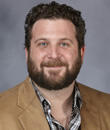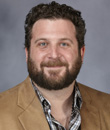
Michael Ian Borer, Ph.D.
Professor and Chair
Biography
Michael Ian Borer joined the faculty at UNLV in 2008 after teaching at Dartmouth College and Furman University. The prospect of exploring the social worlds beneath and beyond the neon lights that dominate the city’s skyline and reputation drew him to Las Vegas and has proven both prosperous and puzzling. His research and teaching specializations include urban and community sociology, popular culture, religion, and qualitative methods. Dr. Borer is primarily interested in the creative ways that people make sense of their social and physical environments through their interactions and experiences with people, places, and things. Moreover, he seeks to uncover how people re-enchant a supposedly disenchanted world with meaning and order. He has authored, co-authored, and edited a number of books about culture and everyday life. His work has been published in City & Community, the Journal of Popular Culture, Social Psychology Quarterly, Symbolic Interaction, Sociology Compass, and the Journal of Urbanism, among others journals and edited books. Dr. Borer has also served as-l the Editor for the Culture Section of the peer-reviewed journal Sociology Compass since 2017. He is the author of Vegas Brews: Craft Beer and the Birth of a Local Scene (NYU Press, 2019); Sociology in Everyday Life (Waveland Press, 2016); Urban People and Places: The Sociology of Cities, Suburbs, and Towns (SAGE, 2014); and Faithful to Fenway: Believing in Boston, Baseball, and America's Most Beloved Ballpark (NYU Press, 2008).
Dr. Borer is an award-winning scholar, teacher, and mentor. He was the recipient of the 2011 Maines Narrative Research Award—granted by the Ethnography Division of the National Communications Association—for his article “From Collective Memory to Collective Imagination: Time, Place, and Urban Redevelopment.” He was awarded the UNLV Graduate and Professional Student Association Outstanding Mentor Award in 2012 and the College of Liberal Arts William Morris Award for Excellence in Teaching in 2014. In 2015, Dr. Borer was presented with the Early-in-Career Award by the Society for the Study of Symbolic Interaction. From 2015-2016, he held a fellowship with the Black Mountain Institute—an international center for creative inquiry that hosts and edits The Believer magazine. In 2019 he was honored as the “Professor of the Game” by the UNLV Runnin’ Rebels men’s basketball team.
As a public sociologist, Dr. Borer is regularly interviewed and quoted about research on cities, urban culture, popular culture, religion, spirituality, social interaction and identity politics for local, national, and international media including National Public Radio, CNN, Fox News, ESPN, Boston Globe, New York Times, Washington Post, Bloomberg News, The Guardian, Los Angeles Times, Univision, Las Vegas Review-Journal, Las Vegas Sun, Las Vegas Weekly, Jerusalem Post, Atlanta Journal Constitution, mlb.com, and Penn & Teller’s Showtime Show “Bullshit.”
Recent Courses Taught
- SOC 414/614 — Popular Culture
- SOC 474/674 — Sociology of Religion
- SOC 461/661 — Self & Society
- SOC 496 — Capstone in Sociology
- SOC 743 — Urbanism & Urbanization
- SOC 766 — Sociology of Culture
- SOC 767 — Visual Sociology: Image, Media, Culture
Current Research Projects
- Exploring City Life: A Qualitative Field Methods Reader (under contract with SAGE)
The social dynamics and contours of urban culture are often confusing. To uncover the ways it works requires a methodological tool-kit comprised of both traditional and nuanced techniques. Tyler Schafer (UNLV PhD Alumnus; Asst Prof at CSU-Stanislaus) and I have compiled a collection of methodologically instructive articles by some of the most cogent and innovative scholars of cities and the ways people live in them. Our book features “reflection essays” by some of the authors of the selected articles that provide first-hand accounts and further demonstrations of their preferred methods. - Spirituality in the (New) Age of Anxiety
In times of social uncertainty, people often turn toward alternative paths of knowledge and belief. This study seeks to uncover the ways that the beliefs and practices that lay under the umbral of “New Age” have been recharged throughout American culture in recent years. Specific attention is being paid to the ways that material culture (e.g., crystals; stones; incense) provides practitioners with access to alternative states of being and knowing.
